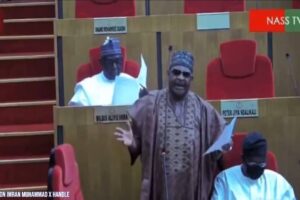Kemi Badenoch, leader of the UK’s Conservative Party, has stood by her past remarks about Nigeria, despite criticism from Nigerian Vice-President Kashim Shettima. Badenoch, who was born in Wimbledon but raised primarily in Nigeria, has frequently highlighted her experiences of fear and insecurity growing up in a country grappling with corruption and lawlessness.
Shettima, addressing the issue during a speech in Abuja, expressed disapproval of Badenoch’s characterization of Nigeria, suggesting that she “remove the Kemi from her name” if she felt ashamed of her heritage. Badenoch’s spokesperson, however, reaffirmed her stance, emphasizing her commitment to truth and authenticity. “She tells it like it is,” her spokesperson said. “She is not the PR for Nigeria but a proud leader of the opposition in the UK.”
Shettima’s Counter-Narrative and Public Reactions
During his remarks in Abuja, Shettima applauded Badenoch for her leadership achievements but critiqued her for what he perceived as denigrating her nation of origin. Comparing her to former UK Prime Minister Rishi Sunak, who celebrated his Indian heritage, Shettima called Nigeria “the greatest black nation on earth” and emphasized his pride in the country’s global contributions.
The vice-president’s comments were met with applause, highlighting a sentiment of national pride among his audience. He acknowledged Badenoch’s right to her opinions but expressed disappointment over her portrayal of Lagos, Nigeria’s commercial capital, and the broader implications for the nation’s image.
Badenoch’s Background and Conservative Values
Born Olukemi Adegoke in 1980, Badenoch spent much of her childhood in Lagos and briefly in the United States before moving to the UK at 16. Her upbringing in Nigeria, marked by economic challenges and political instability, deeply influenced her conservative ideals. At the Conservative Party conference, she recounted her childhood in Lagos as one filled with fear, describing the city as lawless and unsafe.
Her vivid memories of neighbors screaming during burglaries and the constant anxiety over personal safety helped shape her political philosophy. In recent remarks during a US tour, she referred to Lagos as “a place where almost everything seemed broken,” contrasting it sharply with the freedoms she experienced in the UK.
Badenoch’s Firm Stance
Despite the backlash, Kemi Badenoch has refused to back down. A spokesperson for the Conservative leader stated that she “stands by what she says” and emphasized that Kemi Badenoch’s role is to lead the opposition in the UK, not act as a public relations officer for Nigeria. The spokesperson added, “She tells the truth. She tells it like it is. She is not going to couch her words.”
This unapologetic stance aligns with Kemi Badenoch’s reputation as a straight-talking politician who does not shy away from controversial topics. Her reflections on Nigeria have always been framed as lessons learned from her past, and her supporters argue that her criticisms aim to spotlight governance issues rather than disparage the nation.
Broader Implications of the Debate
The exchange between Kemi Badenoch and Shettima underscores the complex dynamics of identity, heritage, and political responsibility. As a Nigerian-born leader in British politics, Badenoch’s statements carry weight on both sides of the Atlantic. For some, her candid remarks about Nigeria represent a call for introspection and reform, while others see them as unnecessarily harsh and damaging to the country’s image.
This controversy also raises questions about the role of diaspora leaders in discussing their countries of origin. Should they speak openly about systemic challenges, or should they tread carefully to preserve diplomatic relations? As Kemi Badenoch continues to navigate her political journey, this debate highlights the fine line between honest critique and perceived disparagement.
By standing firm on her comments, Kemi Badenoch signals a commitment to her principles, even in the face of international criticism. Whether this approach strengthens or strains her connections with Nigeria remains to be seen, but it undoubtedly solidifies her image as a bold and unapologetic leader
Table of Contents
Discover more from OGM News NG
Subscribe to get the latest posts sent to your email.














